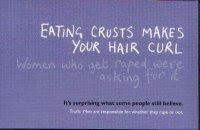
Women’s Voice
Pam Currie
YESTERDAY a newspaper billboard stopped me in my tracks outside Central Station. “Body in garden is Vicky Hamilton”, it read.
Another day, another dead girl - given the high-profile Angelika Kluk murder trial last year, this case will no doubt hold the media spotlight for a few days or weeks before slipping back down the news agenda.
I didn’t know Vicky Hamilton, but that doesn’t matter now. She’s lain dead for over a decade, buried in an unmarked grave hundreds of miles from the
Vicky was the same age as me and we grew up some 20 miles apart, in similar small towns in the East of Scotland.
It could have been me standing at a bus stop that evening, eating chips. It could have been my sister, it could have been any one of my school friends.
It didn’t matter - she was simply a nameless, faceless young woman. Any young woman would do.
After her disappearance, the family and police ran a high profile appeal for information.
Vicky’s face appeared on posters, on leaflets in the hairdressers, on milk cartons.
A stark warning to girls and women in Bathgate, in Bonnyrigg, anywhere - you’re not safe.
Stay at home. Don’t talk to strangers. These streets are not your streets.
This case, of course, will have a particularly salacious appeal to the media - an innocent schoolgirl, pictured immaculate in her uniform - an evil paedo, the ‘bad man’ we had already learned to fear.
We live in a society where, despite the revulsion we feel for men like Tobin, men’s violence against women is normalized and accepted as inevitable.
Murders like Vicky Hamilton’s will attract media coverage because she fits the profile of a ‘good’ victim.
If she was Black, or a sex worker, or hitch-hiking, or in some way ‘asking for it’, then it would be a different story.
Ditto the respectable family man who beats his wife and abuses his daughters - he’s not the bogeyman hiding in the park, to be profiled on Crimewatch and splashed across the tabloids.
Strip away the media spin and it’s the same story: man murders woman. Not, as David Cameron would have us believe, because of the ‘moral slide’ of society, but because we live in a patriarchal society where unequal power relations are about more than just class relations - they are about men’s power over women.
That’s a problem that can’t ever be solved by simply locking up the ‘bad’ men, or even bringing back the death penalty.
It’s a problem that needs a transformation of society - so that women are as free to stand at bus stops at night as men are; so that for once in our lives, we can be free from fear.
















